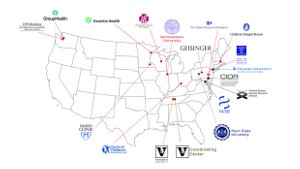Study to explore combining DNA information and e-health records
Dr. Larson will lead NIH-funded grant to better understand genomic basis of disease and give patients tailored care
Group Health Research Institute (GHRI) and University of Washington (UW) received one of a dozen awards from the National Institutes of Health that will support research to incorporate DNA sequence information into electronic medical records. The goal of research conducted by the Electronic Medical Records and Genomics (eMERGE) network is to better understand the genomic basis of disease and to tailor medical care to individual patients based on their genomic differences.
The grants, administered by the National Human Genome Research Institute (NHGRI), represent the third phase of the eMERGE program, and focus on moving genomics research closer to clinical application by identifying the potential medical effects of rare genomic variants (inherited differences in the DNA code) in about 100 clinically relevant genes. The activity of such genes can affect a person’s health, and might affect treatment choices.
Precision medicine
“The new award will allow us to develop leading-edge best practices that will tailor information about a person’s particular genetic makeup to the care that they and their family will receive,” said Eric B. Larson, MD, MPH, the principal investigator of the eMERGE award to GHRI and the UW. “In so doing, we bring the ‘precision medicine’ movement into everyday medical care—a great opportunity for Group Health, the UW, and the scientific community overall.”
Dr. Larson is Group Health vice president for research, the executive director of GHRI, and a clinical professor at the UW Schools of Medicine and Public Health. The amount awarded to the joint Group Health/UW project is $3,385,338 over four years: $1,734,982 to GHRI and $1,650,356 to the UW. Gail Jarvik, MD, PhD, is the principal investigator for the UW. She is a UW professor of medicine and genome sciences, holding the Arno G. Motulsky endowed chair, and an adjunct professor of epidemiology.
The Group Health/UW researchers plan to study preventable diseases and conditions, including inherited forms of colorectal cancer, high triglycerides (which may affect heart health), and high counts of a kind of white blood cell called a neutrophil. High neutrophil counts can signal a disorder involving the immune system.
They will use DNA sequencing to examine the genetic makeup of 2,500 individuals and combine this information with electronic medical records. They will study the effects of sharing such information with patients and families.
Projects across the country
“The newly funded projects are focused on discovering genes and gene variants with clinical implications by using the latest sequencing technologies to examine rare and common variants suspected to relate to disease risk and treatment effects,” said Rongling Li, M.D., PhD, program director for eMERGE in the Division of Genomic Medicine at NHGRI, a part of NIH. “The other important component of these grants is implementing what researchers learn about these gene variants into medical settings to improve patient care.”
Researchers will look at the best ways to provide DNA test results to physicians and patients, she said, and ways in which doctors might use this information to improve clinical treatment and practice. These funded researchers will also examine the psychological and economic effects on patients and families, and the effects on healthcare systems, in using this information.
See the NHGRI’s news release to learn about the other research groups that have been awarded the other 11 eMERGE grants (pending available funds).
National Human Genome Research Institute
NHGRI is one of the 27 institutes and centers at the National Institutes of Health. The NHGRI Extramural Research Program supports grants for research and training and career development at sites nationwide.
National Institutes of Health
NIH, the nation's medical research agency, includes 27 institutes and centers and is a component of the U.S. Department of Health and Human Services. NIH is the primary federal agency conducting and supporting basic, clinical, and translational medical research, and is investigating the causes, treatments, and cures for both common and rare diseases.
About Kaiser Permanente
Kaiser Permanente is committed to helping shape the future of health care. We are recognized as one of America’s leading health care providers and not-for-profit health plans. Founded in 1945, Kaiser Permanente has a mission to provide high-quality, affordable health care services and to improve the health of our members and the communities we serve. We currently serve more than 12.4 million members in eight states and the District of Columbia. Care for members and patients is focused on their total health and guided by their personal Permanente Medical Group physicians, specialists and team of caregivers. Our expert and caring medical teams are empowered and supported by industry-leading technology advances and tools for health promotion, disease prevention, state-of-the-art care delivery and world-class chronic disease management. Kaiser Permanente is dedicated to care innovations, clinical research, health education and the support of community health. For more information, go to: kp.org/share.
Media contact
For more on Kaiser Permanente Washington Health Research Institute news, please contact:
Bianca DiJulio
bianca.s.dijulio@kp.org
206-660-8333
After-hours media line: 206-448-4056
NHGRI Communications:
Steven Benowitz
Steven.Benowitz@nih.gov
(301) 402-0911
healthy findings blog

Lingering Neandertal DNA may raise risk for some diseases
National study by eMERGE researchers—including Drs. David Carrell and Eric B. Larson—compares genetic data to electronic health records.



